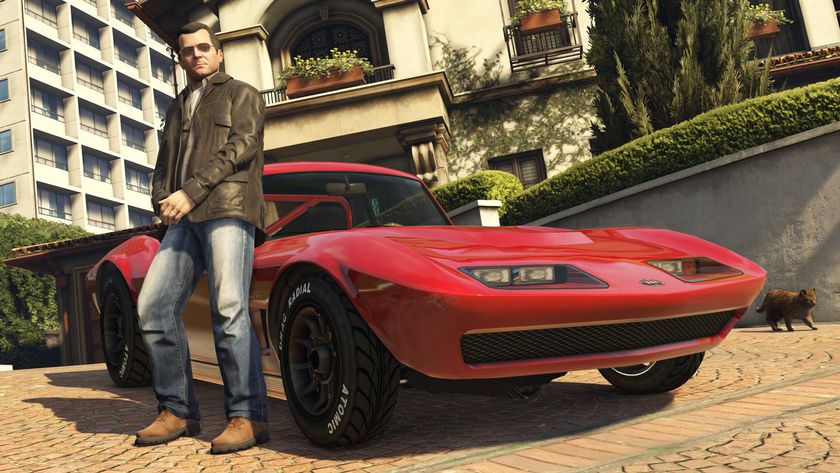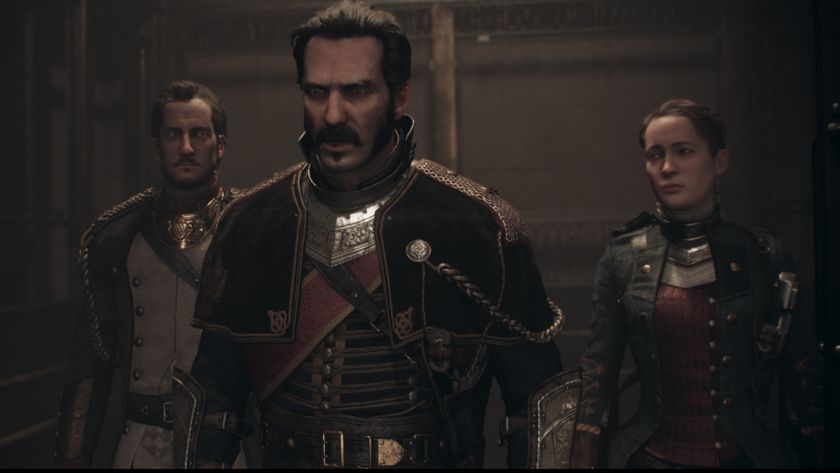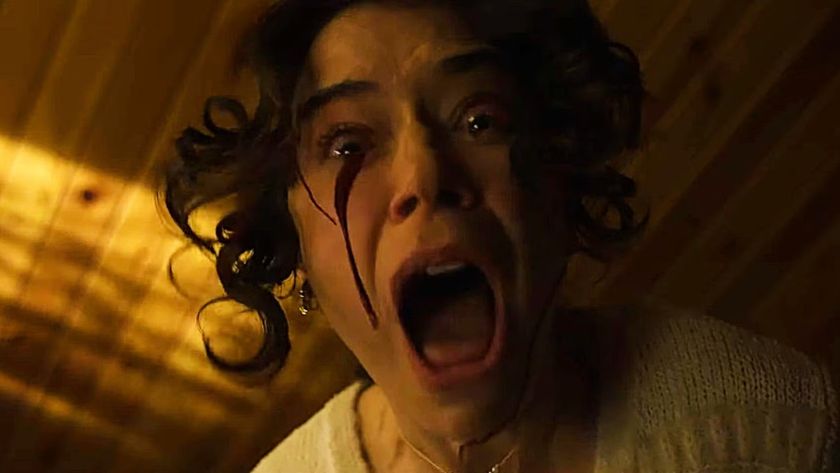Spec Ops: The Line - Learn about the story with lead writer Walt Williams
Find out why the writer wants you to talk away from the game in tears
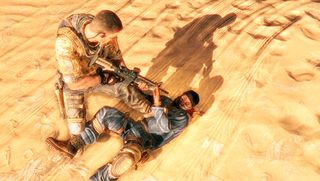
Into the heart of darkness
Spec Ops: The Line looks to shock gamers later this year with a take on war that typically doesn't make its way into games. When we saw the game at a preview event a few months back, we were impressed with the gameplay, but even more excited about the story. Anxious to know more, we got in touch with Walt Williams, lead writer on Spec Ops: The Line, to find out more about the narrative.
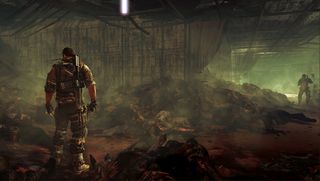
GamesRadar: How early did you get involved in the project?
Walt Williams: I was actually involved since day one of concept, which at this point, I think, is five years ago. There arent too many of us who've been on the team the entire time - like four or five. Strangely enough, 'cause the company is in Berlin, one of the other people on the entire time is also from Texas, in the same basic area that Im from, which is a little weird.
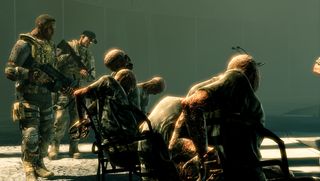
GR: Since you were on the team for that long, did you have a major role in shaping the direction of the game?
WW: Oh, absolutely. From the beginning with Spec Ops the goal was, from a narrative gameplay standpoint, was always they would really kind of build out of each other. Originally, the plan was to try to do it without cutscenes. The entire thing was going to be expressed through gameplay, but we found that cutscenes really added a lot more, giving the emotion across.
We all knew we wanted to do a third-person, squad-based military shooter set in Dubai. Thats the basic ground level of what we were starting out with, and then Yager went off to do it. Im actually on the publishing side, employed by 2K, but Yager went off to develop an idea of a story that they would want to do and where they would want to take the basic concept. Then we went off on the side of 2K and did the same thing. We came back together, we compared notes, and we essentially came up with the same thing that we wanted to do, which is dive deeper into the more realistic moral aspects of military conflict.
So from there, we were able to build and work forward. On top of writing, Ive been audio director, Ive been level director, I have been animation director and cutscenes director. Actually, I think I probably had more of a hand in more parts of the game than most writers do.

GR: What made you decide that you wanted to go into the more psychological, realistic moral side of war?
WW: To be totally honest with you, when it comes to playing these types of games, Ive never been too much of a fan of the military shooter genre. I come from a military family. I spent a very small amount of time in the military. I dont claim to be a military person at all, because it was that small amount of time. I have a lot of friends who are still in it, so it's always been a part of my life. Especially when the war started breaking out back when I was in college, and people were getting sent over. My brother has been over twice. I have a friend who has been over four times.
Seeing them come back and seeing the little differences between them, playing the military shooters has always felt a little off to me, because it was not a representation of what the people I know actually went through. You didnt go over there like Captain America and kill all the bad guys and become a hero because you killed everyone. It wasnt like that. It was really lacking something. It was really glossed over, sort of Hollywood. Especially when you look at the movies and what the movies of war become, like in the '70s and '80s, like Platoon, Full Metal Jacket and Apocalypse Now. They have made that jump from what they had before, which was kinda like the John Wayne hero movie, to these people who have been to war, and express their experiences through film. I felt it was ready for us to do that.
The medium was really to open up and tell a war story that was a bit more emotionally realistic. Ultimately, that really was the desire, was to do something that no one else was doing. Because ultimately, you tell the stories, and you make the game you want to play, and stories you want to read or experience, and we were all kind of coming from that angle. We got these other games out there that we can play. If we just wanted to play a Call of Duty, we would just play Call of Duty. We dont need to make another one of those; thats already out there. But theres this other part. This more dramatic, more raw war story out there that no one is making. We want to play that, and its not there, and its time to fill that niche.

GR: Games have been presenting players with moral choices for years. Was this element baked into Spec Ops from the beginning?
WW: Yeah. We always knew that the choice aspect of it was going to be key. That part is ultimately in conflict. In real war, you come across these moments of choice. They are very different from the choices you usually see in a game; it's not "hit A for good, and B for bad." The choices, in a lot of ways, present themselves simply as moments in the game. They are even not necessarily set up as a choice. You dont even know if you have an option unless you choose and try to mess around and see what you can do with it. That is ultimately really what we were looking to do, is to create more realistic choices in the game. The players will find themselves in situations that they can study it for a little bit and try and figure out whats going on, and see if they want to intervene or think of different ways they can intervene, and maybe what the consequences of the choice would be. Sometimes it is presented more dramatically, more ominously to them, where the character can give the player a choice, and they act on it based off what that character has told them, or they can try and act on it based what they feel inside, and maybe what they can do.
In one instance, there's a spot where you have the two men hanging in front of you and youre supposed to choose which to shoot. You, as the character, are told to do one or the other, but you as the player have the option of doing nothing, or to try and shoot the ropes and free them, or to attack the snipers. I mean, its kind of playing what the character knows and what the player would maybe try and do.
Other times, we have situations that come on to you in the middle of combat, and you dont even realize its a choice until after. Its meant to be a split-second reaction, and you simply have to live with the consequences, because these are the kind of choices you face on a daily basis. They are always different, and sometimes they have long-range effects, and sometimes they dont. Sometimes its just something that happens in our lives, and we have to live with it and you have to keep going, which was ultimately what we were trying to create with these choices. We didn't want something like Well, if Im bad enough, I will get this particular gun, or this particular faction will like me, because that really isnt very realistic. And while, yes, our game takes place in Dubai and its buried under sand and that, in its own way, is not realistic, but it is hyper-realized in a sense. We were looking to use these choices to create more of a hyper-realistic moral situation that the consequences exist more within the player emotionally than necessarily within the gameplay mechanics that feed back into that choice.

GR: Obviously many have pointed out that there are similarities between this story and Heart of Darkness, but are there any other inspirations from books, movies, or anything else?
WW: Everybody brought their own inspirations into it, and I think thats something to keep in mind. From the conceptual phase, we were looking at trying to do something different. Apocalypse Now and Heart of Darkness was a big inspiration, and it is the easiest inspiration to point a connection to, because the setups are the same. Theres this man in a somewhat civilized wilderness who has gone missing, and you have whispers of him throughout as you attempt to track him down.
Where Heart of Darkness and Apocalypse were really the story of courage, Spec Ops is more about Walker and his squad. Its about these men and the journey theyre going through. Conrad is more of the catalyst of their journey, not the main focus of the journey. I know for me, personally, I was inspired by kind of the camaraderie of Generation Kill, the HBO miniseries by the guys who did The Wire, the creating of the squad and that kind of dynamic between them from outside of combat to inside of combat. I was inspired by Jacobs Ladder with Tim Robbins that came out years ago, that kind of dealing with not the horrors, but the emotional and mental trauma that one could experience coming out of combat. The artists bring in their own inspirations. I mean, I can only really speak to my own, but I think you find that in everything. So many games are just inspired by everything we bring into it. Books, films, music, whatever emotional baggage that you have with you from your own life. I mean, Spec Ops is not our attempt to do an adaption of Heart of Darkness. I think that is the key thing. It sets up the framework of the story, then the story quickly branches away from that.

GR: You said earlier that the original intent was to have no cutscenes. Why did that change?
WW: Ultimately we decided to do the cutscenes because it was a third-person game, and theres a very tricky thing with the character of Walker. This is meant to be the players journey as well as the characters journey. Walker has to be empty enough [for the player] to put himself in his shoes, but at the same time, since its in third-person and not first, you've got this reverse action going where the player is seeing the body language and the way he reacts in combat, how he changes from confident, to beaten down, to angry. So Walker has to have enough personality so that hes reflecting his emotions back at the player, so its kind of a circular projection between the player and the character.
Since we were doing third-person, having these cutscene moments could be more emotionally effective to the player than having it in gameplay. We could make a more dramatic scene. Youre already accustomed to seeing Walkers emotions, and were able to make things more dramatic and effective. It ended up being not a design limitation, but an improvement we made. And theres a lot of talk about cutscenes in games being good or bad, but its up to the game. You cant have a blanket rule that covers every game that exists.

GR: Was anything else planned early that ended up being modified or cut?
WW: Not really. I think, once upon a time, we had a time where there was a list of names to track down, but it ended up pulling away from the real story: you and the squad. When you spent all this time tracking other characters, you lost who you were it became so much about something else. The things we ended up not using were cut because they were taking away from the main goal of what we were trying to do. We had to constantly do that, too. Its one of the reasons that, after E3 2010, we kinda went off the radar. Since were trying to tell a story thats more emotionally effective, we had to make sure the things we were doing weren't exploitative. We weren't just trying to shock you for no reason.

GR: Are you concerned at all about gamers going into Spec Ops expecting a gung-ho GI Joe-type game, and being hit with a realistic, gritty story?
WW: I'm kind of hoping they will go into it with that thought, to be honest. The beginning of the game sets up to lull you into a feeling of comfort, that it's something you've played before. I want people to go in and be completely surprised. Don't go in thinking "oh, this will make be feel bad because it's about real war!" Then you're not going to feel too bad. You've tensed up. You're prepared for the punch. If you go in thinking this is Call of Duty, you're standing on a rug that I'm about to pull out from underneath you.
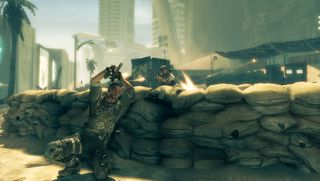
GR: Do you want to make people feel bad about the actions they take in the game?
WW: I want them to feel something about the actions that they take. I use the word "bad" because of how differently we view war in games and in real life. Even people who intend to support war understand that war, in the real world, is a horrible thing to go through. It is not easy for anyone on either side of the conflict.
I just want them to feel. I feel like with so many military shooters, we sit down and put ourselves in the shoes of someone going through combat, and we don't feel anything other than the exhilaration of being on a roller coaster. You hold your hands in the air and go "Whee! Wasn't that fun?" I don't want them to feel bad as long as they're feeling that what they're doing in the game is actually causing real consequences, that this isn't existing entirely for their entertainment. No matter what they feel, as long as it's something, I'm happy. Everyone is going to have a different experience. Through focus testing, we found that everyone has their own reaction depending on the personal morals of the player. I think that's fantastic. If we were getting uniform reactions across the board, that means we've made a story that is guiding everyone down one, linear emotional path. Instead we've created a space for gamers to examine their feelings. And I think, ultimately, that's what you have to do with a game like this. We're not making a statement, we want players to come to their own conclusions.

Spec Ops: The Line comes out later this year. For more information, you can read our preview of the game from a few months back, or check out a trailer below.

Hollander Cooper was the Lead Features Editor of GamesRadar+ between 2011 and 2014. After that lengthy stint managing GR's editorial calendar he moved behind the curtain and into the video game industry itself, working as social media manager for EA and as a communications lead at Riot Games. Hollander is currently stationed at Apple as an organic social lead for the App Store and Apple Arcade.
Most Popular






